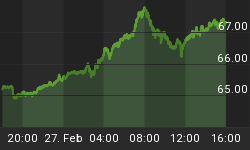Marc Faber, publisher of the Gloom Boom & Doom Report, told Bloomberg Television's Betty Liu on "In the Loop" today that "the fallacy of monetary policy in the U.S. is to believe this money will go to the man on the street. It won't. It goes to the Mayfair economy of the well-to-do people and boosts asset prices of Warhols.
Faber said that he is "very happy. Very good for the Fed. Congratulations, Mr. Bernanke. I'm happy. My asset values go up but as a responsible citizen I have to say the monetary policies of the U.S. will destroy the world."
Faber on more Federal Reserve stimulus:
"It is difficult to tell what will happen. I happen to believe that eventually we will have a systemic crisis and everything will collapse. But the question is really between here and then. Will everything collapse with Dow Jones 20,000 or 50,000 or 10 million? Mr. Bernanke is a money printer and, believe me, if Mr. Romney wins the election the next Fed chairman will also be a money printer. And so it will go on. The Europeans will print money. The Chinese will print money. Everybody will print money and the purchasing power of paper money will go down. And I don't like bonds. I don't particularly like equities, but I think equities are a better space to be in than bonds."
On what he will do with his portfolio in reaction to yesterday's move:
"I own corporate bonds and I recently, as I wrote, I pulled some bonds from Kazakhstan because Kazakhstan economically is a much sounder country than the United States or any European country. But it is in small doses. I wouldn't put all of my money in corporate bonds. They have an equity character. I also own equities still in Asia and as I pointed out already four months ago for the first time in my life I bought equities in Portugal, Spain, Italy and France because they were unbelievably distressed. I think what people overlook today is they look at markets but they don't look at what happens within the market. In the last 12 to 18 months the U.S. has massively outperformed European markets, Asian markets with a few exceptions and now some markets are relatively depressed. I could argue the Chinese stock market is now relatively depressed. So the asset allocators may move some money in Chinese stocks and then they can rally 10% to 20%."
"The fallacy of monetary policy in the U.S. is to believe this money will go to the man on the street. It won't. It goes to the Mayfair economy of the well-to-do people and boosts asset prices of Warhols...Very happy. Very good for the Fed. Congratulations, Mr. Bernanke. I'm happy. My asset values go up but as a responsible citizen I have to say the monetary policies of the U.S. will destroy the world."
On whether there's any credibility in the Federal Reserve trying to bring down the unemployment rate and improve the housing market:
"I think there is a huge misconception and fallacy that money printing can actually improve the rate of employment because the money flows down into the system. It goes first into the banking system and into financial institutions, into the pockets of well-to-do people. If you drop money into my pockets and you have at the same time increased government involvement in the economy and we have the government growing with its regulation and legislation that stifles economic development. I don't want to build a new business. But what I may do is look around the world, where are the distressed assets. So I will go and buy existing assets, takeovers. But takeovers don't add to employment. They destroy employment. Secondly, I would just like to mention one thing. This money printing business, they have been saying that for the last 15 years that bailing out LTCM were necessary. Then they say the NASDAQ collapsed after March of 2000. We need to create another bubble, print money. They created a gigantic credit bubble and the misery that we have today."
On where gold prices are headed:
"I think that the trend for gold prices will be steady, but the trend for the dollar and other currencies will be down. In other words, in dollar terms the price of gold will trend higher. How high it will go, you have to call Mr. Bernanke and at the Fed, there are other people actually that make Mr. Bernanke look like a hawk. So they are going to print money. And they have done it for ages already and where has it led? To record high unemployment essentially since the Great Depression and structural unemployment. Unemployment goes among low paying jobs, not high paying jobs. So, you ought to own some gold, but don't store it in the U.S. because the Fed will take it away from you one day."
On whether he would buy property in the United States:
"Yes. Property prices in the south of the U.S. are very inexpensive compared to property prices around the world. The tragedy is that the people that were evicted from these homes have no access to credit. They have no money. They can't buy them. So, with easy money by the Fed well-to-do people can buy these properties and then rent them out to the people that were kicked out of these homes. What a great achievement of the Fed. First they create the property bubble and destroy the wealth of poor people, then the poor people have to rent and the rents have been up over the last 12 months. What a great achievement. Thank you, Mr. Bernanke."















